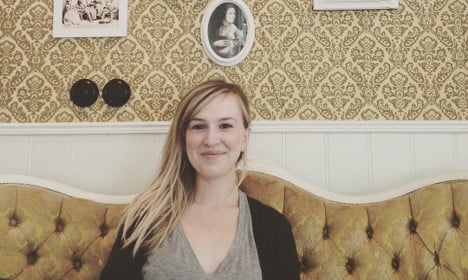It was a combination of her interest in fashion and background studying social science that made Stefanie Smith jump on the offer when a friend asked for her help with a new clothing startup with a twist.
“The idea was to offer customers more transparent clothing for their children. There are a lot of organic and environmentally friendly alternatives around, but not much information about where the clothes actually come from. We hope to close that loophole,” the 28-year-old tells The Local.
Together with Maria Frank and Blerta Deliallisi she founded Pitupi, a slow-fashion children's clothing range which aims to create jobs for disadvantaged women in northern Albania. With Smith living in Lund, southern Sweden, and her co-founders based in Germany, much of the work is done online.
“We focused on Albania because Maria is married to an Albanian and Blerta is Albanian herself, so they had a lot of insight into social issues there and also the fashion industry,” says Smith.
The trio officially opened the digital doors to their webshop last week, after spending the past months selling the clothes from a small boutique in Malmö and via email orders.

Stefanie Smith with some of Pitupi's clothes. Photo: Private
It has been an exciting ride for the American – born and bred in Phoenix, Arizona – who, when she came to Sweden six years ago for university, had no idea she would end up sticking around, let alone add her name to the Nordic country's long list of startup entrepreneurs.
“I came here to do a master's programme at Lund University. I hadn't been to Sweden before and didn't know anyone, but it sounded like a cool adventure. And then, as I'm sure happens to a lot of expats, I met my 'sambo' [a Swedish word for a co-habiting partner]. So school brought me here and I guess love kept me,” she smiles.
Smith and her colleagues managed to set up Pitupi's small-scale clothing factory in a poor region of northern Albania with the help of a crowdfunding campaign, generous international donations and a lot of inspiration from the up-and-coming southern Swedish startup community.
“This is a really good place to start a business. There is understandably a lot of talk about Stockholm, but there's a lot of things going on in Lund and Malmö, incubators, accelerator programmes… you don't even have to go across the Öresund to Copenhagen,” says Smith.
While Swedes are quick to jump on health and eco-conscious trends, social responsibility issues have been comparatively slow to take hold in the world of fashion.
Several internationally famous clothing brands still have the majority of their items sown up inside industrial-size factories run by half-anonymous subsidiaries on the other side of the world. As a consumer, it is often tricky to find out exactly who made your garment and under what conditions they worked.
“Social initiatives are in our fabric in the US, we don't have the same dependency on the state [as in Sweden] so grassroots initiatives have a bigger effect. (…) But people are going past just wanting clean and honest food options to also wanting to know more about what goes into their iPhone, who makes their furniture and so on,” says Smith.
“We're closing all of these loopholes in this big industry that can really do better.”
With Pitupi, she and her co-founders strive to increase this transparency and social responsibility. Not only does it focus on environmental sustainability, but also the social impact of fashion. All items are signed by the seamstress, and customers can then read her story on the website as well as a financial breakdown of the cost of the garment.
“Say you want a hat. You can then click on the specifications to read about everything, including the origin of the material, the labour cost, how much they're making,” explains Smith. “And if customers have more questions they can contact us and we can find out. (…) We can't support the women by ourselves, so we have to listen to the customers.”
The production is based in a northern Albanian village called Krajn and aims to empower women and help them become financially independent, so that they do not fall victim to forced prostitution, domestic violence or other hardships. The long-term goal is to use future revenue to train the seamstresses to take over management of the workshop.

Entela, one of Pitupi's seamstresses. Photo: Pitupi Clothing
Smith says that the response from customers in their focus markets Sweden and Germany, and the US and UK, has so far been positive. And she is confident that the growing interest in transparent slow fashion – as opposed to big business production – will help social entrepreneurs such as herself thrive.
“I sometimes find the focus on tech when people talk about startups frustrating,” she admits.
“It's great, but it's important to remember that it's not just the big IT stuff that's going to have an impact on Sweden – there are a lot of small-scale initiatives that are just as valuable.”



 Please whitelist us to continue reading.
Please whitelist us to continue reading.